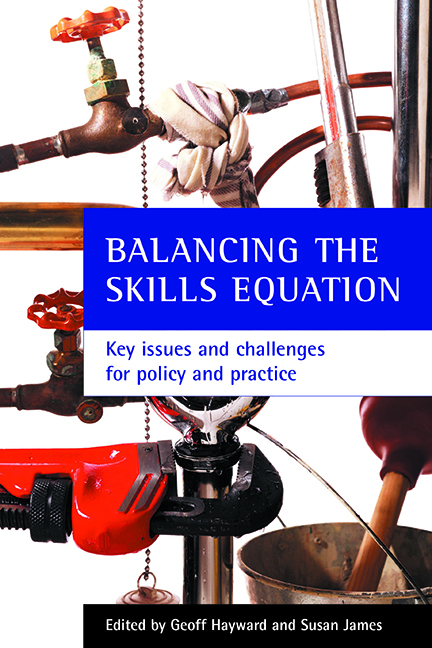Book contents
- Frontmatter
- Contents
- Acknowledgements
- Preface
- Notes on contributors
- one Producing skills: conundrums and possibilities
- two Fit for purpose? Sixty years of VET policy in England
- three The European policy regarding education and training: a critical assessment
- four ‘I can’t believe it’s not skill’: the changing meaning of skill in the UK context and some implications
- five Qualifying for a job: an educational and economic audit of the English 14-19 education and training system
- six Does apprenticeship still have meaning in the UK? The consequences of voluntarism and sectoral change
- seven Tradition and reform: modernising the German dual system of vocational education
- eight Learning in the workplace: reappraisals and reconceptions
- nine Interests, arguments and ideologies: employers’ involvement in education–business partnerships in the US and the UK
- ten Compatible higher education systems and the European labour market: Bologna and beyond
- eleven The expansion of higher education: economic necessity or hyperinflation?
- twelve Becoming a chef: the politics and culture of learning
- Index
- Also available from The Policy Press
eight - Learning in the workplace: reappraisals and reconceptions
Published online by Cambridge University Press: 20 January 2022
- Frontmatter
- Contents
- Acknowledgements
- Preface
- Notes on contributors
- one Producing skills: conundrums and possibilities
- two Fit for purpose? Sixty years of VET policy in England
- three The European policy regarding education and training: a critical assessment
- four ‘I can’t believe it’s not skill’: the changing meaning of skill in the UK context and some implications
- five Qualifying for a job: an educational and economic audit of the English 14-19 education and training system
- six Does apprenticeship still have meaning in the UK? The consequences of voluntarism and sectoral change
- seven Tradition and reform: modernising the German dual system of vocational education
- eight Learning in the workplace: reappraisals and reconceptions
- nine Interests, arguments and ideologies: employers’ involvement in education–business partnerships in the US and the UK
- ten Compatible higher education systems and the European labour market: Bologna and beyond
- eleven The expansion of higher education: economic necessity or hyperinflation?
- twelve Becoming a chef: the politics and culture of learning
- Index
- Also available from The Policy Press
Summary
Learning through work
There needs to be both a reappraisal and reconceptualisation of workplaces as learning environments as the learning of vocational practice in workplaces becomes increasingly legitimised through unfolding conceptions of learning, new pragmatics and a growing interest in learning throughout working lives. Further, the growing interest in workplaces and changing conceptions of learning highlights the urgent need for a workplace pedagogy – a science of understanding how vocational practices can be learnt through work and throughout working lives. Yet, workplaces as learning environments or spaces are burdened by discourses and practices engendered in educational institutions that present selective bases for conceptualising these spaces. Drawing on a programme of research conducted over the last decade, this chapter aims to conceptualise workplaces as legitimate learning spaces on their own terms. It proposes how the initial and ongoing development of vocational practice throughout working lives might best proceed. It proposes and discusses a set of salient and interrelated issues about how workplaces should be conceptualised as learning spaces. Informed by recent theory about learning, these discussions advance bases for:
• reconceptualising the discourse of learning through work;
• viewing workplace learning as participation in work practice; and
• the development of a workplace pedagogy that conceptualises learning through work as participatory practices, and the enhancement of workplace participatory practices.
Throughout, and in summary, implications for policy and practice are advanced.
Reconceptualising workplace learning discourses
There is nothing new about learning in workplaces. They have long been valued and acknowledged as important sites for learning vocational practice, and pre-date educational institutions as sites for learning vocational practice. However, some fresh thinking about workplace learning experiences is now warranted as workplaces become of interest as sites for learning to governments, enterprises, industry groups, educators and workers (Boud and Garrick, 1999). These groups’ interest in workplaces is probably based on a common concern about their effectiveness as sites to develop individuals’ vocational practice for pragmatic reasons associated with cost and accessibility of skill development. Yet, there are other and perhaps more strategic goals to be considered in appraising workplaces as learning environments. These include enhancing the adaptability of individuals’ vocational skills to the changing requirements of work throughout their working life and for different applications of the vocational practice (that is, across workplaces), the development of criticality in vocational practice and to understand how these capacities can best be learnt robustly through authentic workplace experiences.
- Type
- Chapter
- Information
- Balancing the Skills EquationKey Issues and Challenges for Policy and Practice, pp. 149 - 170Publisher: Bristol University PressPrint publication year: 2004



